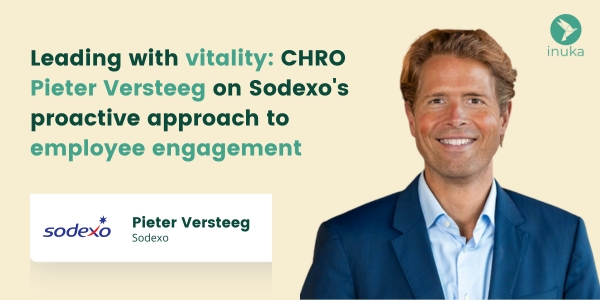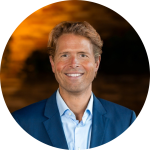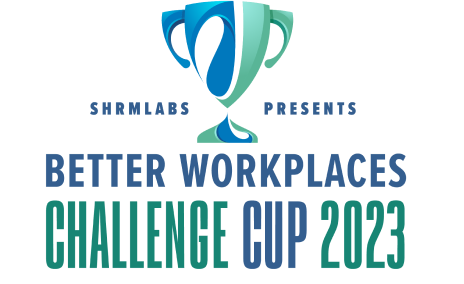Leading with vitality: CHRO Pieter Versteeg on Sodexo’s proactive approach to employee engagement

Sodexo's CHRO, Pieter Versteeg, emphasises the company's innovative strategies for employee well-being, vitality, and resilience, advocating for a proactive, holistic approach that prioritises employee engagement and adaptability in the face of workplace challenges.
Pieter, law and the ‘human’ aspect seem to be the common threads throughout your career. Can you introduce yourself, your journey from international law towards human resources and your role as CHRO at Sodexo?
Of course. I’ve been working at Sodexo since 2017. Three years ago I was approached to take on this new role within HR. When is started in 2017 a new team was being formed, which constituted of Compensation & Benefits, Merger & Acquisitions, Labour Law, and later Recruitment also became part of this team. Eventually, I became CHRO. Before joining Sodexo, I worked at PostNL, Eneco, a medium size law firm WTS in The Hague and the Rotterdam Police. My finalized studies are in international and constitutional & administrative law.
With the police I had the opportunity to join various committees and apply what I had learned in state constitutional & administrative law. I became interested in the human aspect of law when I noticed there was a legal department dealing with internal investigations.
At the law firm WTS the human aspect of law and Employment & Labour Law became my expertise. I learned to know and react on the practices in several companies. At Eneco we were starting to get fully committed to sustainability. I provided training to leaders on how to handle situations with employees (who were ambassadors and/or resistant) regarding to this change. We underwent significant transformations, addressing various major issues. During my tenure at PostNL we offered employment contracts to all independent parcel delivery drivers, which I found to be a significant achievement, as it provided an opportunity for those who desired to work as employees.
Finally, I was approached by Sodexo, and here I face entirely different challenges. We operate in different sectors with distinct cultures. Putting people at the forefront has been a common thread in my career and it’s the purpose of Sodexo as a world leader in services improving the quality of life. Sodexo employs over 400.000 people worldwide and is active in more than 50 countries.

Why is employee well-being, vitality, and resilience a relevant issue at this moment?
In the current environment, having high employee well-being and prioritising employee retention is essential due to the competitive job market. Two key factors are at play here. First, when employees are vital, adaptable, and well-suited for their roles, it reduces turnover and minimises job vacancies. Second, when employees maintain this state, they become advocates for our company externally, attracting high-calibre talent. This is a core focus for me. My fundamental belief centres on prevention being superior to curative.
Our focus is on what’s possible, instead of what cannot be done. Therefore, we promote holistic well-being for optimal performance. This approach represents a significant growth opportunity within our organisation, championed by our leaders.
I’d also like to highlight that the need to disconnect from work is increasingly crucial. To address this, our company intentionally provides a very generous 38 days off per year, during which employees are expected to genuinely disconnect from work.

Is there an aspect of wellbeing that you find particularly pertinent right now?
Yes actually, I wish to address financial well-being. With inflation rates rising, this has raised our significant attention. We initiated discussions with the Employee works council and unions to understand the situation and offer assistance. While a few individuals expressed gratitude for the support, we sensed that many were reluctant to seek help sometimes for example due to shame.
To address this, we used a 24/7 anonymous number Sodexo Supports Me, providing employees and their family members with a platform to voice their concerns. However, the response was for us still to limited. Consequently, we encouraged managers to engage in conversations with their team members, emphasising the availability of Sodexo Supports Me for those uncomfortable speaking with their managers. These discussions with their managers also included options such as working extra hours or selling additional vacation days to improve financial situations. Although precise measurements were challenging to collect, we observed that approximately 8.000 additional vacation days were sold by employees. This led to a significant decrease in wage garnishments.

Related to this investment, have you been able to see the impact on people, their work, and how they drive results in some way?
We had people who reached out for help, and some of those people I’ve met before and after. The way they walk, their posture, and their overall appearance have improved. It’s challenging to measure, but I’ve witnessed stressed out people who’ve grown more relaxed. The change in demeanour is beneficial for everyone, not just the individual but also the entire team. People talk about the effects that particular solutions have had in their lives. I find hearing about these positive impacts very rewarding.

Could you give a brief insight how you organise employees’ well-being, and vitality?
The department is called ‘Vitality, employability, and work suitability’. Our choice of words is very intentional.
We focus on what’s possible, and that aligns with our mission to improve Quality of Live of our employees and all those we serve. When our employees excel, it has a positive ripple effect on our customers, colleagues, and all of us. It’s about getting better every day and helping our team members keep growing. This is also the central theme for our department.
When it comes to vitality, we have various tools and practices in place. We start with conversations between employees and their managers, encouraging open dialogue. We provide additional support and guidance when needed, closely monitoring areas where improvements are necessary. With our extensive presence across 250 client sites, this can be quite challenging, so we analyse absenteeism data to identify areas that require attention.

You mentioned focusing on vitality and employability, but the KPI you mentioned is related to incapacity for work. Can you elaborate?
We have multiple KPIs, the one I mentioned is just one of them. We conduct evaluations, including surveys like vitality assessments and personal interviews with employees. Additionally, we have an annual engagement survey conducted by our global organisation, involving our over 400,000 employees worldwide. We analyse the data to have a good understanding of the needs of our employees, what they like about working at Sodexo and how we can improve. So, it’s of course not solely based on absenteeism figures.

What kind of questions do you have in your employee engagement survey?
The questions revolve around engagement and the relationship with leaders in the teams. We often observe that when engagement and the relationship with leaders are affected, vitality tends to be impacted as well.

Related to vitality and employee engagement, do you have other strategies in place?
Yes, the efforts related to employability. There are two primary steps in enhancing employability. First, we encourage managers to regularly review roles and opportunities with their employees. We’ve recently introduced various career paths and provided 24-hour access to training for specific roles. This enables employees to grow.
We’ve started measuring the impact of these efforts. In the first quarter of this year, certain positions saw an impressive 40% internal progression. This progress is invigorating and confirms our belief that positive energy accompanies personal and professional growth. When individuals are on a path of growth, their energy levels and engagement tend to be higher..
In our approach to employability, we emphasise continuous assessment and adaptability. We utilise career coaches to motivate and guide our employees. This proactive approach allows us to maintain a positive and constructive atmosphere within our organisation.

What would help in the system to encourage individuals to contribute?
Here we face challenges related to the system’s structure, particularly regarding incentives and support for those unable to work. While it’s essential to provide a safety net for individuals facing incapacity, we also believe in incentivising and supporting those who can contribute.
Compared to other countries in western Europe, the Dutch system has a period of incapacity of 2 years which is four to ten times longer (with a maximum period of incapacity of 26 weeks). Also since a couple of years the Dutch system gives people a transition payment of one-third of the monthly salary per year worked. Moreover, there’s a need to review and potentially refine this legislation to a system of incentives which encourages individuals to focus on what they can contribute, without penalising those who genuinely require support due to incapacity.

Do you do anything to proactively seek and match employees to their ideal jobs? What are your thoughts on this approach?
I firmly believe in job shaping. We should put more effort in tailoring a position around an individual, allowing them to gradually take on more responsibilities. Therefore, any occupational health professional who outright states that someone can’t do a certain job, essentially closes the door to something that could benefit. The individual gains by remaining engaged, and the company benefits when someone can still contribute value especially in this tight labour market, and in the end, that contribution tends to grow.

Can you shed light on how your organization is structured?
Two years ago, we made a significant change in our organisational structure. We opted for a different framework, which involved a restructuring process. During this restructuring, we also addressed absenteeism, which was a significant concern at the time. That’s when the department was renamed to ‘vitality, employability and work suitability’, to emphasise its focus.
The transformation demonstrates our commitment to addressing well-being. To dispel the notion that it’s merely an add-on, we took a decisive step by integrating this department into our operations. The department now operates under the Chief Operating Officer (COO), and there’s a dedicated team for this purpose.

Do you have any influence over how it's organised, particularly following the integration into operations? How are you involved?
Well, what you see is that financial matters are definitely within my purview, and I help orchestrate that along with my entire team. Naturally, it’s a collaborative effort, especially since legal, human and leadership aspects often come into play, and we need an integrated team to handle challenging issues.
Personally, I’ve taken on a role more focused on stimulating and ensuring team members’ ideas are heard. We are constantly looking at improvement and innovation. So, at some point, we might bring this responsibility back. I strongly believe in complete flexibility here.

Do you have any concluding remarks for other HR directors?
I find that adopting a positive take on vitality, employability, and fitness for work is the key to success, which means steering away from a culture where we focus on ‘absenteeism’. Employee well-being concerns all of us. As leaders, it’s our primary responsibility to not only implement, but to thoroughly embed the right approach, and a dedicated team helps us all in ensuring and promoting vitality and well-being.

Did you like this interview?
Find more interviews with business leaders of various top companies via the button below. Would you like to receive the next interviews in your inbox? You can register below.
Powered by Inuka Coaching, a #BCorp and value-driven organisation. With our roots in research, we lead on evidence-based, digital and data-driven solutions that achieve measurable impact in employee vitality and resilience.
As part of our mission ‘Everyone resilient’, we strive to bring valuable content to advance the strategic thinking in employee well-being and facilitate a vibrant and growing peer network of leaders, because we all learn faster and achieve more together! Join our peer network of leaders focused on Well-being, register here
Find this post interesting? Share it with your connections!



